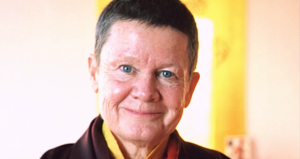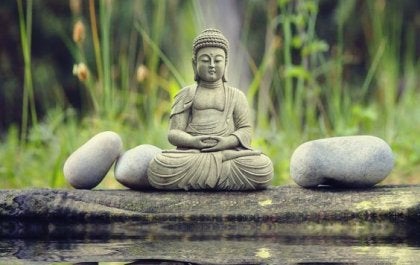The Relationship Between Uncertainly and Change According to Pema Chodron

The teachings of Pema Chodron can show you how, even if it’s difficult to assimilate, life is more like turbulent river rapids than the placid lake we’d like to imagine. Sometimes you might fearfully grab on to something on the river bank out of fear of the turmoil. Precisely that fear becomes an obstacle to you feeling totally alive.
This Buddhist professor and author of numerous books outlines three keys to learning to look inward while on this turbulent river of life. She teaches how to tolerate chaos, uncertainty, and change. These keys are the three agreements and can serve as a good guide for “being completely present” and brave in this world that, at times, seems to want to drown us.
That helm called certainty
You sure do appreciate certainty, don’t you? You live in a world that’s constantly changing. Nothing, or close to nothing, stays still and everything is in motion. Sometimes, you become strongly attached to the utopia of a secure, controllable, and reliable life.

Uncertainty is capable of generating terrible anxiety. It can anchor you to the ideas of a perceived incapacity to overcome obstacles. It can make you a prisoner of your own thoughts and fears. The chaos in which life develops can be summarized in three simple concepts:
- Uncertainty, or not knowing what’s happening.
- Unpredictability, or not knowing what will happen tomorrow.
- Complexity, meaning that everything is connected.
“Life is like stepping onto a boat which is about to sail out to sea and sink.”
-Shunryu Suzuki Roshi-
Facing the chaos
A big part of the discomfort of being human comes from that tendency to want to feel the ground firmly beneath your feet and attach yourself to the dream of constant well-being. People often resist changes because it takes the rug out from under them. But that ground is only an illusion of security.
This resistance to change provokes a lot of suffering and deprives you of the liberty of awakening and discovering your true nature. But what would happen if, instead of getting lost in ambiguity and uncertainty, you simply accepted what you can’t change and relaxed? What if you stopped resisting change? What if you decided to sit down and enjoy the ride?
Pema Chodron and the three agreements
Pema Chodron’s Tibetan Buddhist teachings give keys in the form of vows or agreements with yourself. They’re simple instructions. At their root, they can help you to embrace the chaotic, dynamic, challenging, and changing nature of life. These three agreements are:
- Pratimoksha vow. This first agreement teaches you to do everything in your power to not cause harm with your actions, words, or thoughts. It’s a series of teachings with which you learn how to work with your thoughts and emotions and abstain from speaking or acting out of confusion. It’s the foundation of personal liberation.
- Bodhisattva vow. This agreement is to dedicate your life to keeping your heart and mind open. It consists of nurturing your compassion with the ultimate goal of relieving suffering in the world.
- Samaya vow. This is the resolution to embrace the world as it is, without prejudice. It’s a promise to see everything that you find, good or bad, pleasurable or painful, as manifestations of woken energy. It’s a promise to see everything as a means to awaken further.

Managing chaos
These teachings by Pema Chodron are tools with which to manage chaos and the unpredictable things that can happen in life. It teaches you to manage the uncertainty of not knowing what will come next and to know how to manage change. They help you in the acquisition of certain abilities to know how to handle a great number of challenges that life has prepared for you.
You can manage chaos by learning to transform your mind as changes arrive. You can learn to improvise and trust that you have all the tools you need to handle them. It’s possible to defeat uncertainty by accepting it instead of fighting against it. And once those barriers are overcome, you can enjoy a much more beautiful perspective of life and what it really is: a constant adventure.
This text is provided for informational purposes only and does not replace consultation with a professional. If in doubt, consult your specialist.








